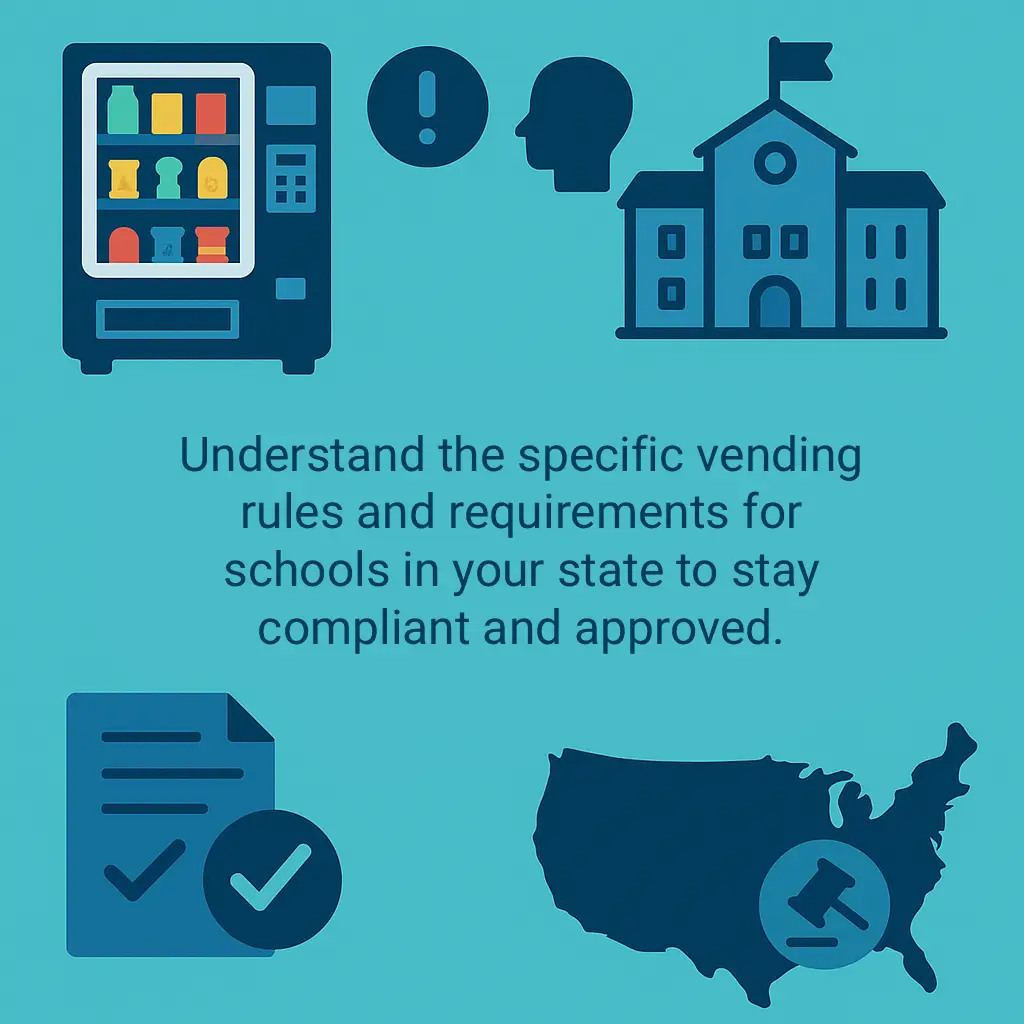School Vending Machine Guidelines by State
Understand the specific vending rules and requirements for schools in your state to stay compliant and approved.
Back to Vending for Schools ResourcesUnderstand the specific vending rules and requirements for schools in your state to stay compliant and approved.
Back to Vending for Schools ResourcesMost K-12 schools follow USDA Smart Snacks standards, which prohibit sugary items and require healthier options. Individual state laws may add extra constraints. Always verify local health and vending guidelines before installing machines on school property.
![]() State regulations often restrict sugary drinks in K-12 schools
State regulations often restrict sugary drinks in K-12 schools
![]() Smart vending helps meet nutrition standards automatically
Smart vending helps meet nutrition standards automatically
![]() Proper compliance avoids funding penalties and complaints
Proper compliance avoids funding penalties and complaints

Schools across the United States must follow specific vending machine guidelines, often shaped by both federal and state laws. For K-12 campuses in particular, vending options are usually governed by the USDA's Smart Snacks in School standards. These rules limit access to sugary snacks and high-calorie beverages during school hours, especially in areas where students have regular access such as cafeterias and hallways.
However, state education departments and school districts may enforce customized rules beyond these federal standards. For example, some states ban caffeine for certain grade levels or restrict vending machines entirely during school hours. Knowing your state’s guidelines is vital—non-compliance could put schools at risk of funding penalties or parent complaints.
School vending machines must balance nutrition with variety. Popular approved items include low-sugar granola bars, whole grain chips, bottled water, and fruit juices with no added sugars. Many schools are also adopting smart vending technology to enforce compliance. These machines can be pre-programmed to restrict access to certain items based on time of day or nutritional profile.
In addition to food and beverage compliance, contactless payment options and regular servicing are now expected. Touchless features not only align with modern preferences but are also more sanitary—an important consideration in school environments. Outdated or broken equipment creates dissatisfaction and draws complaints from both staff and parents.
Finally, high schools, colleges, and universities may have more relaxed regulations than elementary or middle schools, but they still follow regional public health codes. Schools in rural versus urban districts may also experience different expectations around energy drinks or shelf-stable meals.
Use region-specific data to choose a vending setup that aligns with both compliance standards and student preferences. Reliable vendors help ensure machines are stocked with appropriate items year-round.
For institutions aiming to promote health and stay within legal boundaries, it’s important to work with providers that understand local education laws and can deliver customized solutions.
See how healthy choices are increasing in other sectors, or explore reliable service examples outside the education space.
If you're exploring vending options for your business, Vending Exchange can help simplify the process. Delivery, Installation and Equipment is provided at no cost to you - vendors provide the machines, keep them stocked, and handle all servicing. Whether you need a provider or full-service management, just fill out the form on this page to get started.
Most K-12 schools follow USDA Smart Snacks rules, which ban high-sugar, low-nutrition items and limit carbonated sugary drinks.
State education department websites and local school district policies provide the latest vending rules for your region.
In most states, energy drinks are restricted or banned for student-accessible vending machines, especially in elementary and middle schools.
Yes, schools receiving federal meal funding must comply with USDA Smart Snacks regulations in addition to state laws.
While not required by law, touchless vending payment is highly recommended for hygiene and convenience in school settings.
It depends on the district—some schools restrict vending usage during meal programs or instructional time to comply with regulations.
Machines should be restocked weekly or biweekly to ensure freshness, especially in high-traffic schools.
Yes, all vending items must display nutritional information clearly—either on the packaging or a nearby chart.
School administrators and facility managers typically oversee compliance, but the vending provider must also supply compliant products.
Non-compliance can lead to funding cuts, public complaints, or removal of vending privileges on campus.